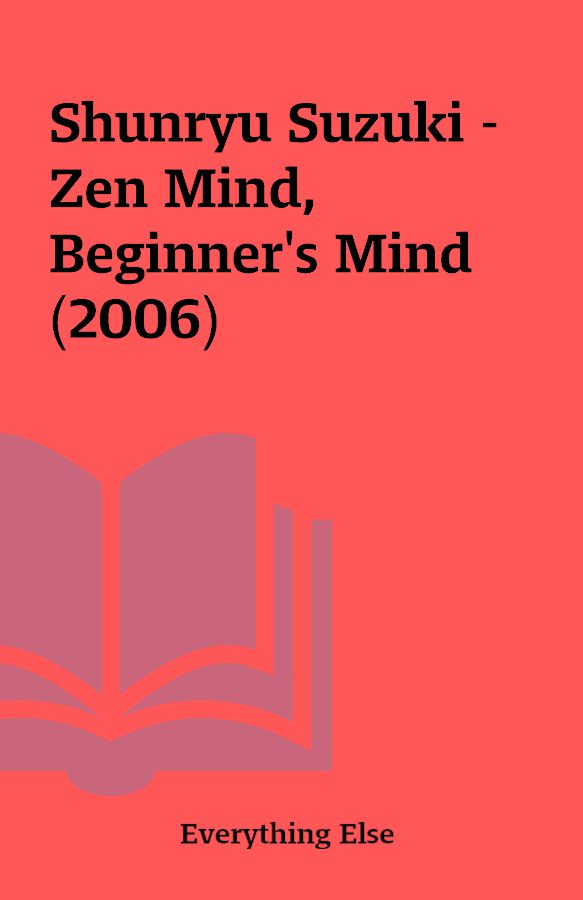Shunryu Suzuki – Zen Mind, Beginner’s Mind (2006)
Zen Mind, Beginner’s Mind (2006) (2)
[1 ebook – 1 PDF, 1 EPUB, 1 MOBI]
Description
elib.tech Exclusive… sharing elsewhere will result in being banned! Shunryu Suzuki – Zen Mind, Beginner’s Mind (2006)Shunryu Suzuki – Author Trudy Dixon – co-Editor Richard Baker – co-Editor and IntroductionHuston Smith – Preface This is a newly created set of files for this famous book. All are OCR quality with linked contents and bookmarks.___________________________________________________”In the beginner’s mind there are many possibilities, but in the expert’s there are few.” So begins this most beloved of all American Zen books. Seldom has such a small handful of words provided a teaching as rich as has this famous opening line. In a single stroke, the simple sentence cuts through the pervasive tendency students have of getting so close to Zen as to completely miss what it’s all about. An instant teaching on the first page. And that’s just the beginning. In the forty years since its original publication, Zen Mind, Beginner’s Mind has become one of the great modern spiritual classics, much beloved, much reread, and much recommended as the best first book to read on Zen. Suzuki Roshi presents the basics—from the details of posture and breathing in zazen to the perception of nonduality—in a way that is not only remarkably clear, but that also resonates with the joy of insight from the first to the last page. It’s a book to come back to time and time again as an inspiration to practice. From Wikipedia:Zen Mind, Beginner’s Mind is a book of teachings by the late Shunryu Suzuki, a compilation of talks given to his satellite Zen center in Los Altos, California. Published in 1970 by Weatherhill, the book is not academic. These are frank and direct transcriptions of Suzuki’s talks recorded by his student Marian Derby. Trudy Dixon and Richard Baker (Baker was Suzuki’s successor) edited the talks by choosing those most relevant, arranging them into chapters.According to some, it has become a spiritual classic, helping readers to steer clear from the trappings of intellectualism.Reviews:”Buddhism may be said to have begun with the enlightement of the Buddha. Many centuries later, however, when Buddhism entered China, an incredibly elaborate and complex superstructure of Indian scholastic thought had grown up around the Buddha’s original insight. The Chinese, with their basically down-to-earth and common sense attitude, had little use for Indian over-elaboration and set about ridding Buddhism of it.The Chinese, as Lin Yutang says, believe in a reasonable use of reason, and not in reason’s excesses. The end product of their effort to rid Buddhist thought of its heavy freight of scholasticism, and to shift the emphasis from theory back to the practical by centering Buddhism once again in the enlightenment experience, became what the Chinese know as Ch’an and the Japanese as Zen.As Shunryu Suzuki himself pointed out, when freed of unnecessary theory and speculation, Buddhism as Zen becomes something that is basically ‘quite simple’. . . Zen Mind Beginner’s Mind is a golden book that may be heartily recommended to all open-minded readers. In it they will find a Buddhism freed of all scholastic superfluities and unnecessary elaboration, and one that returns us to what the Buddha was really about.” ~ tepi (Amazon)”This was the first book on Zen I read some twenty years ago. To a westerner conditioned to experience one’s perceptions through the filter of the mind, it was near incomprehensible at the time and it was only many years later, as I began to establish my sitting practice, that I was able to read Suzuki-Roshi’s talks with benefit.This book will probably make little sense to you if you do not practice zazen. If you are looking for an intellectual exposition of Buddhist thought, there are many other books that will better suit your purpose.If you are looking for a how-to method for sitting practice, this book is also probably not the best place to start. However, if you are looking for encouragement with your sitting practice, this book is what you are looking for. Suzuki-Roshi’s gentle words will nudge you back onto the cushions and help you feel that there is some sense in what you are doing. His compassion shines through on every page.” ~ Jisetsu (Amazon)”Zen Master Suzuki gives the most lucid exposition on practicing zen ever put on paper. The teachings are not watered down, sugar coated, or given false pretenses as the absolute truth. The chapter on meditation exemplifies all these qualities. To Suzuki, just the act of sitting zazen is meditation itself and as a consequence, enlightenment. No mention of mystical visions, long processes of clearing the mind and becoming “one with the universe” – his only instruction is to perceive simple reality. As a long time meditator, I have found Zen Master Suzuki’s approach much more honest and fruitful than any of the methods that use various mediums(i.e. imagery, sounds) to facilitate meditation. The rest of the book constantly reaffirms this simple yet profound concept. Anyone interested in Zen Buddhism, out of spiritual or intellectual curiosity, should start here.” ~ B. Yoon (Amazon)About the Author:Shunryu Suzuki (鈴木 俊隆 Suzuki Shunryū, dharma name Shōgaku Shunryū 祥岳俊隆, often called Suzuki Roshi) (born May 18, 1904, Kanagawa Prefecture of Japan; died December 4, 1971 in San Francisco, California, U.S.A.) was a Sōtō Zen monk and teacher who helped popularize Zen Buddhism in the United States, and is renowned for founding the first Buddhist monastery outside Asia (Tassajara Zen Mountain Center). Suzuki founded San Francisco Zen Center, which along with its affiliate temples, comprises one of the most influential Zen organizations in the United States. ~ WikipediaUploader’s comment:I was fortunate to receive teachings from Richard Baker Roshi many years ago at a conference on Buddhism and Psychotherapy. His style was electrifying and charismatic. One lady fled his teachings with loud exclamations of surprise. She was unable to contain her reactions to his presence as a teacher.As the successor to Shunryū Suzuki, he was a walking example of dharma transmission, I suspect. For many years I searched for any books written by Baker Roshi, but found only one mentioned, but never available. Perhaps he felt Suzuki Roshi had said it all.___________________________________________________
You must be logged in to post a review.






Reviews
There are no reviews yet.